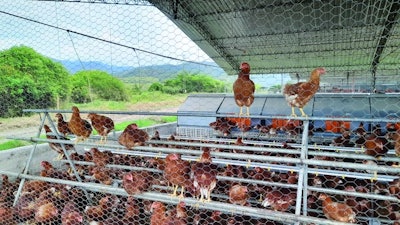
Colombia has seen an increase in egg consumption over the last decade that far outstrips that witnessed anywhere else in the world, while, at the same, its producers have become more sustainable
Since 2010, global egg consumption has increased by 35% to reach an annual average of 185 eggs per person. This increase varies significantly across continents and among countries, yet no nation has been able to match the growth observed in Colombia.
The latest data available reveals that, between 2010 and 2021, Colombians increased their consumption of eggs by 120 eggs, or by 56%. By comparison, per capita egg consumption increased over the same period by only 15% in the U.S., by 13% in Germany and by 9% in the U.K.
Driving force
Colombia’s national association of poultry and egg producers, FENAVI, has been at the heart of the poultry and egg sectors’ growth and is proof of the value of a well-funded and well-organized producers’ association. This amazing increase in consumption is not, however, the only fact that sets Colombia apart and makes it a model for other countries.
The rapid expansion of egg production in Colombia has also led to an unusual change in the housing systems used for egg production.
Economics of cage-free
While cage systems dominate egg production in all major egg-producing countries, in 2021, 59% of Colombia’s laying hens were housed in cage-free systems, almost exclusively floor systems. Colombia is the exception, not only in Latin America, but among the top 10 largest egg producing countries.
Economic considerations have been the main driver behind this predominance of cage-free systems. Cage free barns are quicker and cheaper to build than houses with cages, but for some companies the decision to follow this route was not simply based on economics.
Take, for example, the company NutriAvicola, which markets its products under the brand "Huevos Oro," seen as a gold standard for animal welfare. The company has more than 45 years of experience with cage-free production and, with close to 3 million hens raised on the floor, is probably the largest cage-free producer in Latin America.
Located in a region where the outside temperature varies between only 18 C and 26 C year-round, the production of cage-free eggs in open-sided houses provides the ideal environment for laying hens with few dust particles in the air, a low level of ammonia and no flies to upset neighbors. With reported productivity similar to that obtained in cages, NutriAvicola is a good example of sustainable egg production.
Recognizing the importance of sustainability as key for the future of the poultry and egg sectors, FENAVI has been working over the past two years with local experts to develop strategies and tools to assist producers in further improving their social, economic and environmental sustainability.
With a program designed to go well beyond the current Colombian regulations, FENAVI has also adopted an independent auditing and certification scheme, with three levels – bronze, silver and diamond – of sustainability granted to producers.
Launched in early 2022, the program, designed to help farmers through capacity building on technical and regulatory environmental issues, field support and stakeholder consultations, also supports research projects and cooperation with other entities to further improve the sector’s sustainability.
With animal welfare integrated into this auditing scheme, FENAVI has likely designed a truly holistic evaluation of the sustainability of the poultry and egg sectors, with no equivalent in the world.
Colombia is not only a major poultry and egg producing country but also a thought leader offering other countries a roadmap to sustainable development of the sector.

















